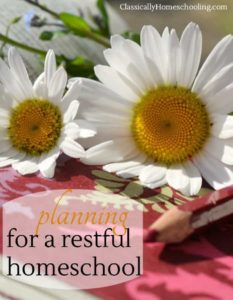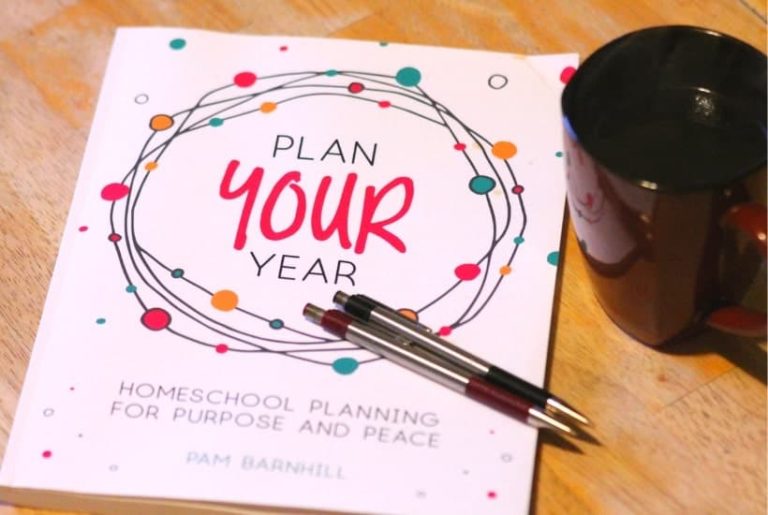Everyday Scholé: Planning for a Restful Homeschool
This post may contain affiliate links. For more information, please read my disclosure policy.
Planning for a Restful Homeschool
Have you considered what it takes to plan for a restful homeschool? First, you need to consider how busy the year will be. How will your year affect the number of subjects you cover and the number of activities you’ll be involved in?
Let’s take a look at how you can plan for a restful homeschool.
Busy Year or Full Steam Ahead?
The first point I consider is how busy do I expect the year to be? There are many life events that make for a fuller than average year. For instance:
- Junior and senior years of high school (testing, applications, visiting schools)
- The first year of college
- Changing jobs
- Retiring
- Starting a new business
- Illness
- Having a baby
When you’re expecting a fuller year than normal, don’t plan extra academics or activities! It isn’t time to jump into half a dozen wonderful volunteer positions. It’s a surefire way to burn yourself and your children out. If anything, back off and plan a lighter year.
By the same token, if you’ve realized your plate is empty go ahead and fill it up! This is time to try a new activity, add additional volunteer opportunities, or to learn a new language.
Each year brings a new season into our lives. Some seasons are chaotic and others peaceful. For a restful homeschool, carefully consider how much time and energy you have for schoolwork or outside activities and adjust accordingly.
Number of subjects and curricula
Don’t add and add and add subjects, curricula, and programs until the school day for your first grader is 12 hours long. You’ll wear yourself and your child out. Instead, be intentional about the subjects and curricula you cover in your restful homeschool.
That doesn’t mean just stick to reading, writing, and math without covering Latin, fine arts, spelling, science, or history. It means to be thoughtful about your time and energy. Every subject and curriculum takes time and energy. Are the benefits worth the expense?
For instance, if you’re covering phonics while teaching a child to read, do they still need to be covering spelling this year? Spelling is simply applied phonics. Could you combine the two or skip spelling entirely? There are quite a few of us who begin spelling lessons after the child finishes phonics.
Do you need separate curricula for all of the language arts, or can you combine several subjects? For instance, Tapestry of Grace offers literature and writing lessons. Rod and Staff English combines writing and grammar. Many programs combine spelling, copy work, and dictation.
What about a rotating system? Some families hit history hard in the fall and then switch over to science in the spring. It cuts down on the number of subjects to be covered at any given time, allows for more depth, but keeps a reasonable breadth to your children’s studies.
Rotating through subjects on a loop or weekly schedule keeps everything covered without driving yourself crazy every single day. Write down your goals and the subjects you wish to cover this year. Then consider how you wish to arrange the subjects.
Not everything needs to be covered single every day, week, or quarter. You have a year to cover everything you need in a restful homeschool.
Number of Activities
The number of outside activities my family is involved in makes a difference to my sense of peace and rest. I’m a firm believer in children’s need for downtime. We need time at home to run, play, school, and create.
This downtime gives kids the opportunity to explore interests and passions. They create books, draw pictures, solve Rubix cubes, play chess, write letters, read novels, and run screaming around the yard.
Don’t skip outside activities though. Activities give children the opportunity to make friends, be exposed to new ideas and concepts, and explore areas of possible interest.
The number of activities we participate in as a family change. Some people need to be moving and active every day. Others of us need regular downtime to sit, read, and think.
Adapt your activities to the level you and your children need to be safe and happy. A restful homeschool should be a happy homeschool.
 Consider next year as a whole
Consider next year as a whole
Once you’ve sat down to think if it’s going to be a busy or normal year, pondered your curricula, and considered next year’s activities, meditate on how it will look as a whole. I like to fill out a weekly spreadsheet with all activities, volunteer work, meals, sleep, homeschool hours, etc. filled in. It gives me a birds’ eye view of how next year will run.
If we have so many hours of outside activities that we have no time for academics, something needs to change. If we have so little planned that the kids have days of free time, I’ll plan more activities or outings.
I like to aim for a schedule with regular activities outside the house but enough give-time for academics that we’re not rushing to finish every day. The children have time to follow interests and passions.
I have time to relax and enjoy my restful homeschool.
Recommended Reading:









You know, it’s really funny to me – all the years I’ve been homeschooling and this is the first year I realized I don’t need to cover every subject every week.
We have done a rotation of a week of history followed by a week of science but I’m planning to change that this coming year. We’re going to focus just on history for 24 weeks and then switch to science for the rest of the school year after that.
Really great post, Sara. I love your advice about taking a light year if you expect life to be extra busy. Sometimes it’s easy to get caught up in the ‘must finish it all/fit it all in’ mentality that we don’t step back and look at the year as a whole.
Thanks, Tonia! I love your plan to focus on history and then focus on science. It’s a great way to be able to add depth and breadth at the same time. 🙂
Thanks for the advice.
Thanks for dropping by, Laura. 🙂
I love the idea of tracking your outside the home commitments for the year and the week. That’s such an important part of creating a restful year, but it’s not talked about very often. Thanks for sharing!
So you’re saying that I shouldn’t be doing book work with my 1st grader for 12 hours straight? Eek! I’d better go switch some things around! haha 😉
Haha! 🙂 I want to see the 6yo who can sit for 12 hours straight and the mom who can keep ’em there without going insane! 😉